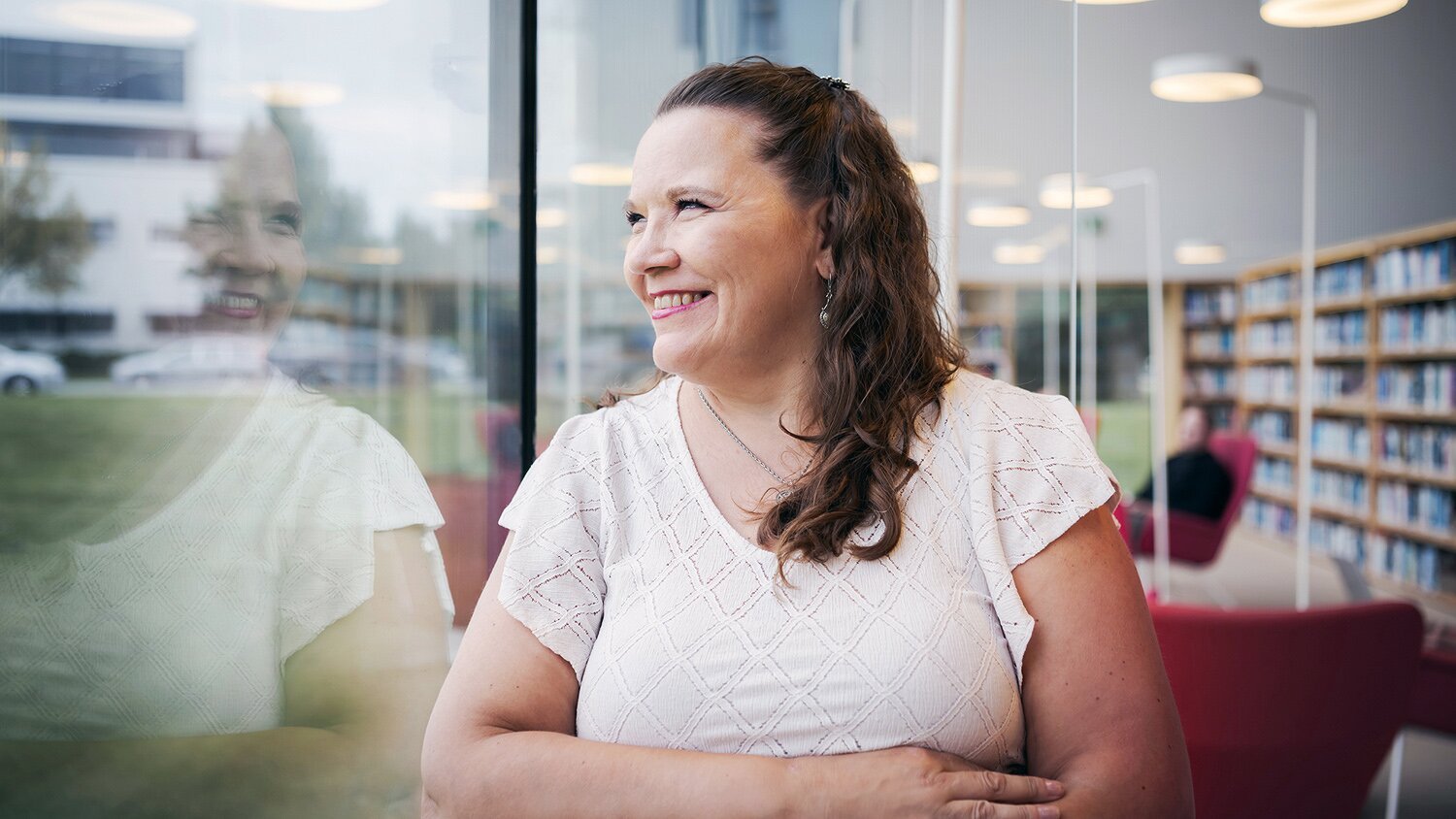Lessons – “I wish I'd realised as a teenager how dangerous smoking is”
“When I was 17, I could never have imagined that in another 17 years, I might get chronic obstructive pulmonary disease (COPD), from which I would never recover. I was already addicted to tobacco in upper secondary school, but I didn't understand why smoking was dangerous or what I would have to give up if it made me ill.
Under the age of forty, I started to get short of breath on the stairs and hilly terrain. When I went jogging, my steps became shorter and my legs started to feel numb. I'd had recurrent respiratory and sinus infections for many years, but I hadn't thought much about them.
My first major wakeup call was on All Saints' Day in 2009. My mother and I were taking candles to the graves and I was getting so breathless that I had to ask my mother, who is 31 years older than me, to slow down. I will never forget the fear and astonishment on my mother’s face when she realised that something was terribly wrong. We had to go back to the car to let my breathing return to normal.
I continued to smoke despite this. A month later, I met an elderly couple through my work. The wife apologised for how heavily her husband, who had COPD, was breathing. They had just come from the hospital, where her husband had been receiving supplemental oxygen therapy. This stopped me in my tracks: I realised that I could be facing the same thing. I made an appointment through my occupational healthcare provider and received my diagnosis. After a few weeks, I stopped smoking.
Difficult moments – “I avoid situations with people that might make me start laughing”
I once woke up in the middle of the night when my pillow had fallen to the floor and my airways were blocked. It was awful to wake up feeling like I was going to suffocate. I never want to experience anything like that again.
COPD has forced me to give up the physical activities that were once so important to me. I no longer go to the gym, or to keep-fit or dance classes. Group exercise classes are too fast-paced for me, and in cramped indoor spaces it feels like there is not enough oxygen. I don’t go for walks with my husband anymore either, because I can’t keep up with him. At tango dancing events, I might dance with my husband, but even then I can only manage one or two hops, and that’s it.
Another thing that I avoid nowadays is laughing from the bottom of my heart. If I start to get the giggles, I start getting a horrible wheezy coughing fit that won’t stop. If I’m in the company of strangers, someone might think I need an ambulance. That’s why I avoid situations in company where I might start laughing. I sometimes take myself off to the toilet. It’s terribly sad that I can no longer let myself experience such joy.
Hope – “I find it easier to be in a warm climate by the sea”
My motto is: don't give up. When I was young, I used to do orienteering, and then I learned that if you can't go down one path, you have to look for another. Even if I have to give something up because of my illness, I try to think about what else I could do to give me strength and energy.
For example, I didn't dare to run for ten years because I was afraid I would put too much strain on myself. But I have been doing water running. The moist air in the swimming pool makes it easy for me to breathe. Recently, my asthma medication was modified, and I don't feel as out of breath as I used to. It has given me the courage to run calmly on dry land again.
I try to enjoy every day as much as possible. Despite my illness, I am living the most wonderful time of my life right now. I have just become a granny for the first time. I hope to have many years together with my grandchild. I also hope to travel to Spain many more times. I find it easier to be in a warm climate and by the sea.
 When Päivi Kuoppamäki was diagnosed with COPD, she told her doctor that she would do anything to quit smoking. “I got a prescription for smoking cessation medicine and quit smoking immediately. My motivation was high, so quitting wasn't as hard as I thought it would be."
When Päivi Kuoppamäki was diagnosed with COPD, she told her doctor that she would do anything to quit smoking. “I got a prescription for smoking cessation medicine and quit smoking immediately. My motivation was high, so quitting wasn't as hard as I thought it would be."
Support - “When I am with my understanding colleagues, I never have to be on my guard”
I draw strength from those who are closest to me: my husband and children, my mother and friends. I am also lucky to work in the healthcare and social welfare sector with a wonderful and understanding working community around me. With them, I never have to be on my guard, because they have a good understanding of different diseases.
I only started applying for peer support last year. I also suffer from Crohn’s disease, and this has previously taken such a great toll on me that I have not been able to think about the ways in which COPD will affect my life.
My Crohn’s disease is now in a steadier phase, so I feel that I want to soak up all the information I can about COPD. I recently applied for a peer holiday through a patient organisation and after this I’ll be able to participate in adaptation training. I look forward to having the chance to talk to my peers. I believe that gaining knowledge and sharing experiences will help me and my family prepare for the future.
I have also trained as an experience worker for the Organisation for Respiratory Health in Finland to network nationwide and change the common perception that COPD is only a disease of older men.”
Chronic obstructive pulmonary disease (COPD)
- What is COPD? An estimated 200,000 Finns suffer from COPD. It is a slowly progressive lung disease in which the small airways become restricted, lung tissue is destroyed and exhalation slows down. The vast majority of people with the disease are smokers, but long-term exposure to different types of dust in the workplace, for example, can also predispose to COPD.
- Symptoms. Initially, symptoms are mild, such as coughing and phlegm. As the disease progresses, symptoms include shortness of breath and wheezing. Eventually, even slight exertion increases the symptoms, and with severe COPD, shortness of breath can occur even at rest.
- Treatment. Non-pharmacological treatment includes quitting smoking, regular exercise and, if necessary, losing excess weight. Bottle blowing can help to get rid of excess phlegm. Symptoms and the risk of flareups can be managed with drug-based treatment: inhaled medicines and tablets. In the advanced stage of the disease, oxygen deficiency may require oxygen therapy, positive pressure ventilation treatment or surgical treatments.











